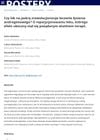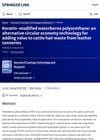 August 2023 in “Dermatology and Therapy”
August 2023 in “Dermatology and Therapy” Experts recommend personalized treatment plans for best outcomes in managing Alopecia Areata.
 May 2023 in “Journal of The American Academy of Dermatology”
May 2023 in “Journal of The American Academy of Dermatology” Most lab tests for patients with Telogen effluvium, a type of hair loss, show no or mild abnormalities; only a few specific tests are useful.
355 citations,
January 2017 in “Journal of the American Academy of Dermatology” JAK inhibitors show promise for treating skin conditions like eczema, hair loss, and psoriasis.
[object Object] 88 citations,
August 2019 in “Frontiers in immunology” Tyrosine kinases are important in skin autoimmune diseases and could be targets for new treatments.
 58 citations,
August 2015 in “The Indonesian Biomedical Journal”
58 citations,
August 2015 in “The Indonesian Biomedical Journal” Different types of stem cells help maintain and heal skin.
35 citations,
January 2018 in “Vitamins and hormones” DHEA affects various tissues by interacting with multiple receptors and can be converted into sex hormones.
30 citations,
June 2017 in “Journal of cutaneous medicine and surgery” Topical ruxolitinib failed to regrow hair in a 66-year-old with alopecia areata.
25 citations,
December 2017 in “The journal of investigative dermatology. Symposium proceedings/The Journal of investigative dermatology symposium proceedings” Targeted cytokine treatments may help with alopecia areata, but more research is needed.
 24 citations,
November 2023 in “Nature”
24 citations,
November 2023 in “Nature” The extracellular matrix affects where tumors can start in the body.
22 citations,
June 2017 in “Stem cell reports” PTEN helps control the number and health of skin stem cells by working with the protein BMAL1.
19 citations,
April 2019 in “Veterinary dermatology” Oclacitinib effectively treated a skin condition in dogs that didn't respond to other immunosuppressants.
 8 citations,
June 2022 in “Frontiers in Medicine”
8 citations,
June 2022 in “Frontiers in Medicine” Both individual and combined treatments of tofacitinib and corticosteroids can help regrow hair in moderate-to-severe alopecia areata, but ongoing treatment may be necessary.
7 citations,
February 2009 in “Cell and tissue biology” 6 citations,
September 2011 in “Journal of the American Academy of Dermatology” A man with HIV had an unusual syphilis rash that looked like folliculitis but was cured with penicillin.
4 citations,
February 2019 in “Breast Cancer Research and Treatment” DHL-HisZnNa may help reduce hair loss from chemotherapy, but more research is needed.
 3 citations,
May 2019 in “Ginekologia Polska”
3 citations,
May 2019 in “Ginekologia Polska” Adolescents with abnormal uterine bleeding often have polycystic ovarian syndrome and insulin resistance.
 2 citations,
October 2022 in “Current Dermatology Reports”
2 citations,
October 2022 in “Current Dermatology Reports” People on immune-modifying skin disease treatments may have a weaker antibody response to COVID-19 vaccines but often improve after the second dose.
2 citations,
May 2022 in “International Journal of Trichology” Brazilian Keratin Treatment can cause skin reactions like redness and scaling, possibly due to formaldehyde.
 2 citations,
November 2021 in “ACG Case Reports Journal”
2 citations,
November 2021 in “ACG Case Reports Journal” Tofacitinib successfully treated hair loss in a Crohn's disease patient who previously used adalimumab.
 1 citations,
July 2023 in “F&S Reviews”
1 citations,
July 2023 in “F&S Reviews” Some common medications may harm male fertility by affecting hormones, sperm production, and sexual function.
1 citations,
January 2016 in “Methods in molecular biology” The method helps estimate and track skin cell growth and movement during healing.
January 2025 in “International Journal of Pharmaceutics” The treatment showed significant hair regrowth in alopecia areata patients without side effects.
 November 2024 in “Journal of Cosmetic Dermatology”
November 2024 in “Journal of Cosmetic Dermatology” Baricitinib is effective for severe alopecia areata but has some side effects.
 November 2024 in “Postępy Biochemii”
November 2024 in “Postępy Biochemii” Latanoprost may be a promising new treatment for hair loss.
 November 2024 in “SKIN The Journal of Cutaneous Medicine”
November 2024 in “SKIN The Journal of Cutaneous Medicine” Ritlecitinib provides new treatment options for diverse alopecia areata patients.
July 2024 in “Journal of Controlled Release” Nanostructured lipid carriers effectively deliver tofacitinib to hair follicles, reversing hair loss in alopecia areata.
[object Object]  June 2024 in “Australasian Journal of Dermatology”
June 2024 in “Australasian Journal of Dermatology” Tofacitinib is safe and effective for treating moderate-to-severe alopecia areata.
 April 2024 in “JCT research”
April 2024 in “JCT research”  March 2024 in “International journal of pharmaceutical and bio-medical science (Print)”
March 2024 in “International journal of pharmaceutical and bio-medical science (Print)” Angelica Sinensis and Chinese Arborvitae have various medicinal benefits, including anti-inflammatory and anti-cancer effects.
 March 2024 in “Current materials science”
March 2024 in “Current materials science” Fisetin, found in fruits and vegetables, may help treat various health conditions like inflammation, diabetes, heart issues, cancer, and hair loss.
















